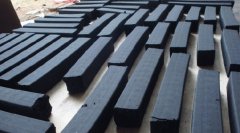
While Jean Reniteau mulls over the idea of using solar panels to light his house, Frantz Fanfan is wondering how to expand production of biomass briquettes to replace the use of charcoal in the cooking stoves of most of the Haitian people, who lack electricity.
“At home we have a ban on cooking with charcoal. We have to put an end to this custom,” says Reniteau, a social communicator and university professor, while Fanfan, manager of a briquette factory producing ecologically friendly fuel in Port-au-Prince, says he wants to “stop deforestation” and aspires to flood the local market with his products.
“If we don’t stop indiscriminate tree felling, in future even the mango trees we still have in our fields will be cut down and converted to charcoal,” says Fanfan, who argues that briquettes are the best choice for families to be able to cook their meals without harming the environment and people’s health.
He points out that the briquettes are a cheap fuel, costing less than charcoal and propane gas, and are non-polluting and help eliminate city waste. “We are contributing to cleanliness in the country,” he said.
El Fuego del Sol‘s factory produces 5,000 briquettes a day with a manually operated machine. The ingredients are basically cardboard, paper and sawdust, which are converted to pulp and placed in rectangular moulds to dry. So far they are meeting the needs of the World Food Programme (WFP) for fuel for some of the schools it assists.
Children at the Saint-Joseph School in Fleuriot, a poor neighbourhood to the north of Port-au-Prince, have lunch each day as part of the school meals programme provided by the United Nations agency in several parts of Haiti.
The school receives briquettes for cooking, as well as food for the meals. It also has a specially designed stove, donated by the WFP, which burns the ecological fuel.
“We’re working on a prototype of a similar stove so that we can enter the national market with our product. Without it, people will use the traditional fire pits they usually cook on with charcoal, and they won’t appreciate the benefits (of the briquettes), they’ll think they’re no good,” says Fanfan.
WFP sources tell IPS that Saint-Joseph is one of 29 schools that receive briquettes as well as food, in a programme that is still being developed with the view that it will be useful for agencies working on clean energy production.
Oraginal Articals >> www.ipsnews.net/2013/04/solar-energy-and-briquettes-make-headway-in-haiti/
 Español
Español










